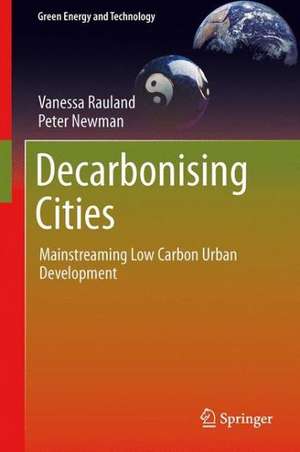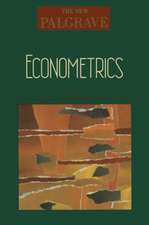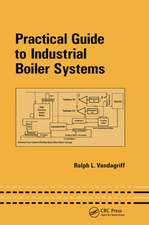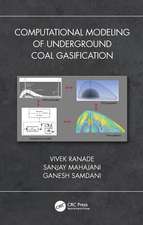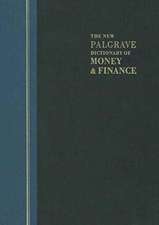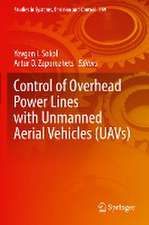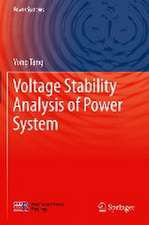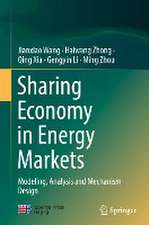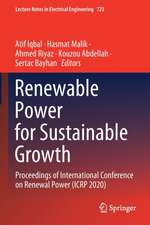Decarbonising Cities: Mainstreaming Low Carbon Urban Development: Green Energy and Technology
Autor Vanessa Rauland, Peter Newmanen Limba Engleză Hardback – 9 apr 2015
Decarbonising cities is a global agenda with huge significance for the future of urban civilisation. Global demonstrations have shown that technology and design issues are largely solved. However, the mainstreaming of low carbon urban development, particularly at the precinct scale, currently lacks sufficient: standards for measuring carbon covering operational, embodied and transport emissions; assessment and decision-making tools to assist in design options; certifying processes for carbon neutrality within the built environment; and accreditation processes for enabling carbon credits to be generated from precinct-wide urban development.
Numerous barriers are currently hindering greater adoption of high performance, low carbon developments, many of which relate to implementation and governance. How to enable and manage precinct-scale renewables and other low carbon technologies within an urban setting is a particular challenge.
| Toate formatele și edițiile | Preț | Express |
|---|---|---|
| Paperback (1) | 780.68 lei 6-8 săpt. | |
| Springer International Publishing – 6 oct 2016 | 780.68 lei 6-8 săpt. | |
| Hardback (1) | 786.66 lei 6-8 săpt. | |
| Springer International Publishing – 9 apr 2015 | 786.66 lei 6-8 săpt. |
Din seria Green Energy and Technology
- 18%
 Preț: 943.43 lei
Preț: 943.43 lei - 20%
 Preț: 629.52 lei
Preț: 629.52 lei - 18%
 Preț: 1124.92 lei
Preț: 1124.92 lei - 18%
 Preț: 947.35 lei
Preț: 947.35 lei - 15%
 Preț: 655.92 lei
Preț: 655.92 lei - 18%
 Preț: 957.62 lei
Preț: 957.62 lei - 18%
 Preț: 789.52 lei
Preț: 789.52 lei - 17%
 Preț: 464.55 lei
Preț: 464.55 lei - 15%
 Preț: 645.79 lei
Preț: 645.79 lei - 18%
 Preț: 903.93 lei
Preț: 903.93 lei - 24%
 Preț: 1322.07 lei
Preț: 1322.07 lei - 18%
 Preț: 890.54 lei
Preț: 890.54 lei - 18%
 Preț: 1115.46 lei
Preț: 1115.46 lei - 18%
 Preț: 1117.03 lei
Preț: 1117.03 lei - 18%
 Preț: 949.73 lei
Preț: 949.73 lei - 18%
 Preț: 892.11 lei
Preț: 892.11 lei - 15%
 Preț: 648.24 lei
Preț: 648.24 lei - 18%
 Preț: 997.09 lei
Preț: 997.09 lei - 15%
 Preț: 579.81 lei
Preț: 579.81 lei - 18%
 Preț: 1123.15 lei
Preț: 1123.15 lei - 18%
 Preț: 961.41 lei
Preț: 961.41 lei - 17%
 Preț: 490.22 lei
Preț: 490.22 lei - 18%
 Preț: 904.60 lei
Preț: 904.60 lei - 15%
 Preț: 643.34 lei
Preț: 643.34 lei -
 Preț: 287.90 lei
Preț: 287.90 lei - 24%
 Preț: 634.04 lei
Preț: 634.04 lei -
 Preț: 379.39 lei
Preț: 379.39 lei - 18%
 Preț: 783.20 lei
Preț: 783.20 lei - 18%
 Preț: 1394.84 lei
Preț: 1394.84 lei - 18%
 Preț: 1691.57 lei
Preț: 1691.57 lei - 18%
 Preț: 1112.48 lei
Preț: 1112.48 lei - 15%
 Preț: 592.61 lei
Preț: 592.61 lei - 18%
 Preț: 952.09 lei
Preț: 952.09 lei - 18%
 Preț: 944.19 lei
Preț: 944.19 lei - 18%
 Preț: 891.33 lei
Preț: 891.33 lei - 18%
 Preț: 1252.44 lei
Preț: 1252.44 lei - 18%
 Preț: 789.52 lei
Preț: 789.52 lei - 20%
 Preț: 566.29 lei
Preț: 566.29 lei - 18%
 Preț: 1113.71 lei
Preț: 1113.71 lei - 18%
 Preț: 1114.24 lei
Preț: 1114.24 lei - 24%
 Preț: 590.58 lei
Preț: 590.58 lei - 20%
 Preț: 567.49 lei
Preț: 567.49 lei - 24%
 Preț: 907.48 lei
Preț: 907.48 lei - 18%
 Preț: 952.89 lei
Preț: 952.89 lei - 18%
 Preț: 952.89 lei
Preț: 952.89 lei - 18%
 Preț: 950.52 lei
Preț: 950.52 lei
Preț: 786.66 lei
Preț vechi: 959.34 lei
-18% Nou
Puncte Express: 1180
Preț estimativ în valută:
150.55€ • 155.52$ • 125.29£
150.55€ • 155.52$ • 125.29£
Carte tipărită la comandă
Livrare economică 25 martie-08 aprilie
Preluare comenzi: 021 569.72.76
Specificații
ISBN-13: 9783319155050
ISBN-10: 3319155059
Pagini: 200
Ilustrații: XVIII, 266 p. 35 illus.
Dimensiuni: 155 x 235 x 22 mm
Greutate: 0.58 kg
Ediția:2015
Editura: Springer International Publishing
Colecția Springer
Seria Green Energy and Technology
Locul publicării:Cham, Switzerland
ISBN-10: 3319155059
Pagini: 200
Ilustrații: XVIII, 266 p. 35 illus.
Dimensiuni: 155 x 235 x 22 mm
Greutate: 0.58 kg
Ediția:2015
Editura: Springer International Publishing
Colecția Springer
Seria Green Energy and Technology
Locul publicării:Cham, Switzerland
Public țintă
ResearchCuprins
Addressing Three Wicked Problems.- The Global Shift to a Low Carbon Economy.- Why Cities?.- Low Carbon Resource Management in Cities.- The Precinct – The New Scale for Decarbonising.- Eco Precincts.- The Rise of Carbon Neutrality.- Counting Carbon in Cities.- Rating Carbon in Urban Development.- Certifying for Carbon Neutrality.- Spotlight: The Australian Government Carbon Neutral Standard.- A New Framework and Core Elements.- Making it work.- Final Thoughts.
Notă biografică
This book summarises the research undertaken by Dr Vanessa Rauland during her PhD, which was guided by Professor Peter Newman. Vanessa spent over four years coordinating an Australian Research Council (ARC) Industry Linkage Grant titled ‘Decarbonising Cities and Regions’ and currently lectures at Curtin University in the areas of Climate Policy and Decarbonising Cities. Peter is a Professor of Sustainability at Curtin University and has been working and conducting research on cities for over forty years. He has published 15 books on a range of urban sustainability issues, making him one of the most well known authors in this field. He sits on the Board of Infrastructure Australia and is a lead author on Transport in the IPCC Fifth Assessment Report.
Textul de pe ultima copertă
This book sets out some positive directions to move forward including government policy and regulatory options, an innovative GRID (Greening, Regenerative, Improvement Districts) scheme that can assist with funding and management, and the first steps towards an innovative carbon credit scheme for the built environment.
Decarbonising cities is a global agenda with huge significance for the future of urban civilisation. Global demonstrations have shown that technology and design issues are largely solved. However, the mainstreaming of low carbon urban development, particularly at the precinct scale, currently lacks sufficient: standards for measuring carbon covering operational, embodied and transport emissions; assessment and decision-making tools to assist in design options; certifying processes for carbon neutrality within the built environment; and accreditation processes for enabling carbon credits to be generated from precinct-wide urban development.
Numerous barriers are currently hindering greater adoption of high performance, low carbon developments, many of which relate to implementation and governance. How to enable and manage precinct-scale renewables and other low carbon technologies within an urban setting is a particular challenge.
Decarbonising cities is a global agenda with huge significance for the future of urban civilisation. Global demonstrations have shown that technology and design issues are largely solved. However, the mainstreaming of low carbon urban development, particularly at the precinct scale, currently lacks sufficient: standards for measuring carbon covering operational, embodied and transport emissions; assessment and decision-making tools to assist in design options; certifying processes for carbon neutrality within the built environment; and accreditation processes for enabling carbon credits to be generated from precinct-wide urban development.
Numerous barriers are currently hindering greater adoption of high performance, low carbon developments, many of which relate to implementation and governance. How to enable and manage precinct-scale renewables and other low carbon technologies within an urban setting is a particular challenge.
Caracteristici
Presents a detailed analysis of how the process of decarbonizing urban cities can be achieved using global examples of policy approaches that can incentivize innovative low carbon development Utilizes several international case studies to show significant potential for developers, local governments, and community groups to participate in collaborative low carbon urban development Designed for professionals and the general public as well as university students from a range of urban and policy disciplines Includes supplementary material: sn.pub/extras
